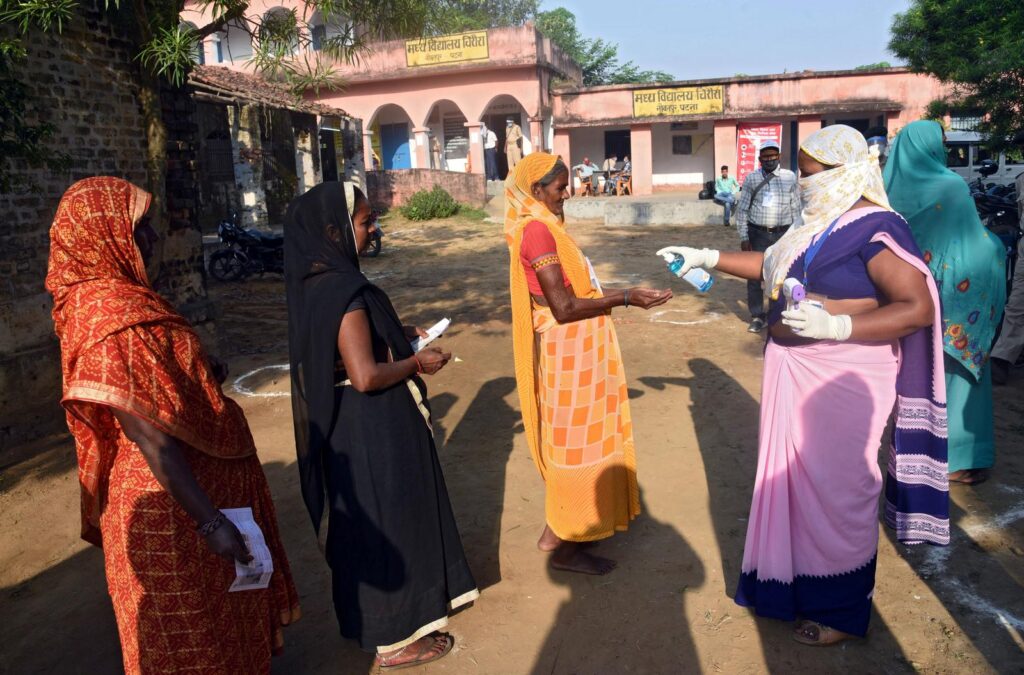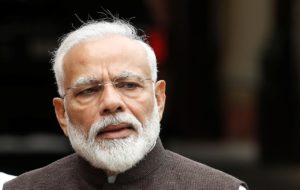Ex Civil Servants Sound Alarm Over Electoral Roll Revision In Bihar

A woman sprays sanitiser on a voter's hand as she and others wait in a queue to cast their vote outside a polling booth during the state assembly election, amid the spread of the coronavirus disease, at a village on the outskirts of Patna, Bihar (Representative Image)
A collective of former civil servants, known as the Constitutional Conduct Group (CCG), has issued a stern warning regarding the Election Commission of India’s (ECI) Special Intensive Revision (SIR) of electoral rolls in Bihar, asserting that it jeopardizes the very foundation of Indian democracy—universal adult suffrage. The CCG, which comprises retired members of the All India and Central Services, emphasized that their concerns are rooted in constitutional values of neutrality and impartiality, stating, “We have no political affiliations; our only allegiance is to the principles of democracy.”
The group expressed alarm over the potential disenfranchisement of millions of citizens, particularly among the poor and marginalized, who may lack sufficient documentation to prove their citizenship. Historically, the CCG noted, India’s electoral system has operated on the principle of inclusion, presuming citizenship unless challenged. They argued that the ECI has traditionally taken proactive measures to ensure that even those in remote and marginalized communities are included in the electoral process. “The current exercise reverses this principle by placing the burden of proof on voters themselves,” the CCG stated.
The former bureaucrats highlighted that a more liberal approach to documentation had previously been adopted, recognizing the widespread absence of official papers among the impoverished. In stark contrast, they criticized the SIR for imposing rigid requirements that could strip voting rights from millions who have been registered in elections since 2003. “This is a significant departure from the inclusive practices of the past,” they asserted.
Particular concern was raised regarding the ECI’s decision to prioritize the 2003 electoral rolls, which allows electors from that year to avoid providing new documentation. The CCG described this as creating an “untenable, unjust and discriminatory” hierarchy, effectively ignoring all subsequent rolls published over the last two decades, including those used for the upcoming 2024 Lok Sabha elections. “This approach is not only discriminatory but also undermines the integrity of the electoral process,” they added.
The statement further accused the ECI of introducing the controversial National Register of Citizens (NRC) “through the backdoor” under the guise of sanitizing voter lists. The group outlined several alarming aspects of the new procedure, including the shifting of the burden of proving citizenship onto voters, the usurpation of powers constitutionally vested in the Home Ministry, and the nullification of recent electoral rolls. They also pointed out that the arbitrary documentation requirements disproportionately affect women and the poor, while vesting extraordinary discretionary powers in local officials, which could lead to corruption and abuse.
The CCG referenced multiple media reports, particularly investigations by journalist Ajit Anjum, that revealed widespread irregularities in the SIR process. Allegations included forged signatures, bulk-filling of forms by Booth Level Officers (BLOs), and the enrolment of deceased individuals. “These reports highlight a troubling trend of unethical practices and fraudulent enrolments,” the CCG noted.
During a public hearing in Patna on June 21, presided over by former Chief Information Commissioner Wajahat Habibullah and retired Patna High Court judge Justice Anjana Prakash, testimonies from villagers further underscored these concerns. The CCG warned that the “breakneck” pace of the SIR, coupled with inadequate infrastructure and opaque procedures, has compromised the integrity of the entire process. They cautioned that the continuation and potential expansion of this exercise beyond Bihar could pose “one of the biggest threats Indian democracy has faced.”
In their letter to the public, the civil servants expressed frustration that their previous petitions to the ECI had been “ignored and casually dismissed.” They urged citizens to mobilize public opinion to pressure the Commission into taking corrective action. The CCG also expressed hope that the Supreme Court, currently examining the matter, would intervene. “We are familiar with the complexities of conducting elections in a vast democracy like ours,” they said, emphasizing the need for a fair and inclusive electoral process.





